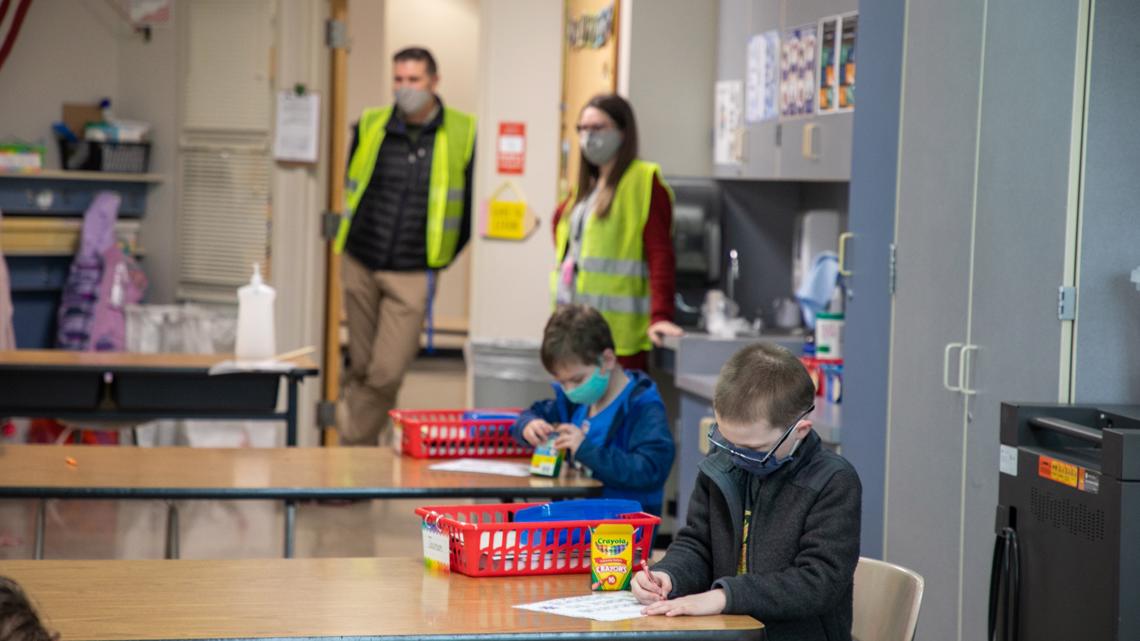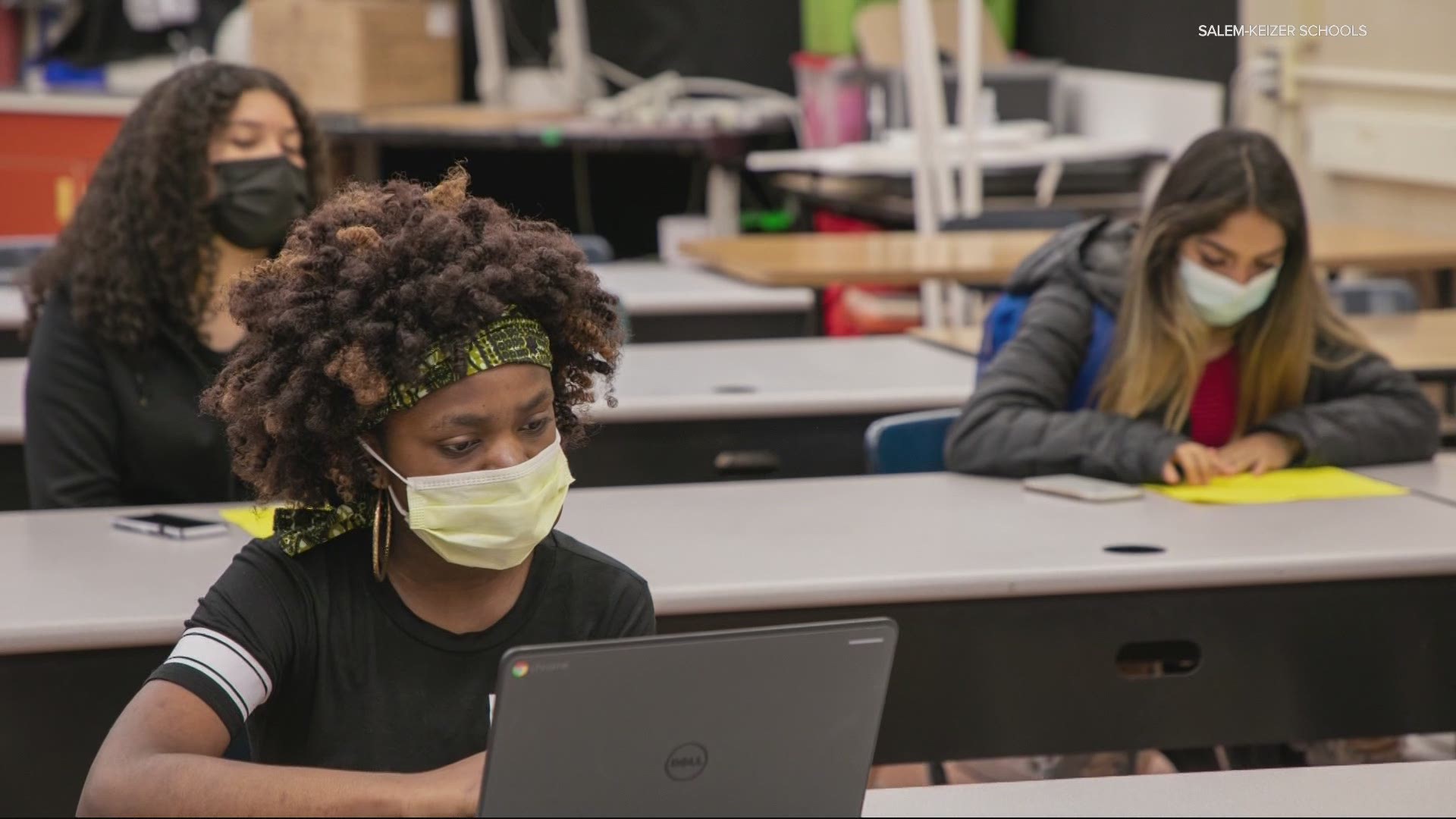SALEM, Ore. — Students, their families as well as school staff and teachers have come a long way. Students who chose hybrid learning are back in the classroom and before they know it, it’ll be summer break.
Salem-Keizer Public Schools was one of the first large districts in Oregon to welcome back students for in-person, hybrid learning. Kids in grades K-12 who chose hybrid, have collectively been in the classroom two days a week for more than a month now.
Chris Moore, a school psychologist for Salem-Keizer Public Schools, said overall kids are thrilled to be physically back in school.
“I think across the board there’s been a general sense of relief,” said Moore.
He said while it may be hard to believe, some kids who are spending just two days a week in school are accessing more academic instruction than they might in a full week of full-time in-person instruction before the pandemic.
“When there are fewer students in the room, there’s more of an opportunity to have direct one-on-one contact or more responsive support from teachers or support staff. It helps students be more focused,” Moore said.


Even so, he said students are also seeking support
“Yes, students are seeking counselors and support staff out and counselors and support staff are also seeking kids out and ways to connect,” he said.
Moore said there are a few themes he and other support staff keep hearing.
“One is that kids are out of the routine of relating to each other and navigating social situations and what do you do when you have a mask on and what are your new kind of rituals for interacting and connecting. And I think kids have expressed to us that that’s hard for them,” said Moore.
In addition, he said student stories about their struggles during the pandemic are starting to come out too and staff have been trained to keep an ear open.
“We have over 1,200 of our staff throughout the district trained in QPR, which is question, persuade, refer. It’s a suicide prevention training program,” Moore said.
“With students in buildings two days a week, with smaller classes, I see a lot of support staff more intentional about responding to students' needs.”
Figuring out ways to help struggling students
Moore said for years, the district has been working to improve student mental health. He said back in 2009-2010, the district started to see a dramatic shift in rates of anxiety, depression and suicidal thoughts among kids.
He said it was clear more needed to be done to support kids.
"Pre-pandemic we were concerned about whether students felt a favorable sense of belonging. That ends up being a really powerful predictor for rates of anxiety and depression and suicidal ideation," said Moore. "When kids feel like they belong, when they feel like they’re seen, they’re heard and they’re valued and matter and that they’re not alone, they’re more likely to feel better about themselves, to engage with their learning and with their peers and with their teachers."
He said the district started really focusing on that work a few years back when they realized many students didn't feel a sense of belonging. During the pandemic, the numbers they saw weren't great.
"What we saw was one out of four kids were feeling disconnected and frustrated. What we saw was there were some students who we weren’t able to reach," Moore said.
It wasn't for lack of trying. Teachers and other support staff have reached out to kids who needed more help during the pandemic. Moore said once school started in the fall, there seemed to be more excitement among students. Some did well distance learning, without having to deal with the complex relationships associated with school.
Others floundered. Over the course of the year, there's been work to try to make sure students who need help, get it.
“We’ve finally reached a point now where all 65 of our schools in our district will have a dedicated school mental health community partnership through our established longtime partners of Marion County Children’s Behavioral Health, or Polk Behavioral Health, or Trillium Family Services or our new partner Stronger Oregon,” said Moore.
He said a few years ago, the number of schools with a dedicated mental health community partnership was only about 20. While the work started before the pandemic, the effort to increase access ramped up the past year.
Moore said the district has been clear, connecting with students as well as promoting a sense of belonging is important and it’s key to a student's performance in school. They've also asked students for their input.
“They’ve also told us, in no uncertain terms, don’t try to catch us up, catch up with us about who we are, where we’re at, what this last year has been like and what we need moving forward. Listen to us,” said Moore.
What other mental health professionals are hearing
That sentiment is similar to what Dan Rothenberg, a private-practice therapist who counsels teens, says he’s also hearing. He said the work isn’t over for parents at home.
“Really try to give kids room for their experience and room for their feelings,” said Rothenberg.
Rothenberg said he’s encountered a mixed bag when it comes to what he’s been hearing from teens.
Earlier in the school year, he said he heard a lot about kids’ environmental challenges.
“In other words doing academics from their home, in many cases from their bed, really decreased their motivation.”
Now, as students near the end of the year, he said teens have been somewhat ambivalent.
“A lot of kids are like let’s just wrap this up online,” he said.
"It's messy. But it's the right work."
Meantime back at Salem-Keizer Public Schools, Moore said the goal is to move forward with a collective focus on continuing to meet students’ social/emotional needs after a heck of a year.
“When we listen deeply, we have a better understanding of what kids need. So, I think there’s been a much more intentional effort of many of our schools to listen to what students are saying they need,” Moore said.
“We have a long way to go. It’s imperfect. It’s messy. But it’s the right work.”

